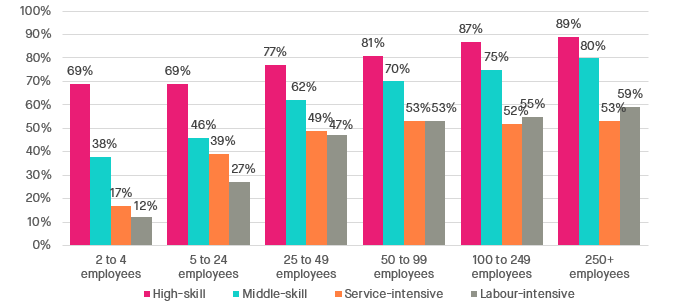The debate surrounding Britain’s low pay problem continues to be primarily focused on the wage floor.
The most recent contribution has come from the Chancellor, who pledged to increase the National Living wage to £10.50 per hour over the next five years and to expand its coverage, which will give an additional pay rise to workers aged 21-24.[i]
Gradually raising the wage floor over time has undoubtedly benefitted many workers at the bottom end of the income distribution; the latest announcement will most certainly continue this trend.
However, as the SMF recently argued,[ii] increasing the legally mandated minimum wage does not address the issue that the UK labour market provides few opportunities for pay progression and career progression, especially amongst low-paid workers. Low productivity growth, rising housing costs and a freeze of in-work benefits have resulted in an environment where, in 2017, eight million people lived below the poverty line, despite living in a family where at least one person was at work.[iii] Many low-paid workers are stuck on their low salary: between 2006 and 2016, just one in six (17%) of workers managed to transition out of low pay and remain on a higher salary.[iv]
One way that career progression is limited for the low-paid is through lack of access to training. Our analysis highlights that employees in lower-skilled occupations were the least likely skill group to have undertaken any form of job-related training in the past 12 months.
Figure 1: Training incidence in the past 12 months, by skill level and employer size

Source: SMF analysis of Employer Skills Survey 2017
Base: All firms providing training
Note on terminology:
High-skill includes managers, professionals, and associate professionals;
Middle-skill accounts for administrative/clerical staff and skilled traders;
Service-intensive is defined by caring, leisure, and other services staff and sales and customer services staff;
Labour-intensive occupations are machine operatives and elementary staff
With a general lack of policy innovation to address the challenges of pay and career progression, our latest research explored the potential role for corporate decision-making to drive the necessary changes in this area, with a focus on low-paid workers.
In addition to recommending for Section 172 of the Companies Act to be amended so that corporate directors will have an obligation to ensure and demonstrate that every employee in the company is sharing in the proceeds of company growth, we also evaluated the types of pressure which can be exerted by internal and external stakeholders in order to enable progression.
The role for stakeholder pressure
Public attention has been shifting towards the impact of business practices not just on consumers, but also on their employees, the surrounding communities in which operations take place, wider society, and the planet. However, pressure from consumers, investors, prospective workers, and the wider public has not yet manifested significantly in a form which pushes companies to offer better wage and career progression to the low-paid.
To help build third-party pressure on corporate behaviour, one of the recommendations we outlined in our recent research was for the Government to require additional disclosure of information from companies – data on wages, progression opportunities, training budget, HR practices, and key targets for the future. Just as gender pay gap reporting has facilitated a wider public discussion about gender and the workplace, this set of information could enable the engagement of the public with the issues surrounding low pay and progression.
This policy is likely to be most effective at influencing the actions of firms which are concerned about their reputation, as they would want to avoid a negative public image that could affect demand for their products or services from consumers or influence how they are viewed by investors.
We view investor activism as a particularly powerful lever which could help deliver wage and career progression for low-paid workers. Firstly, individual and institutional investors should consider how treatment of low-paid workers could feature more prominently and extensively in ESG criteria. We commend Share Action for developing some thinking in this area,[v] however more third parties should follow suit. Criteria could include availability and take-up of training among low paid employees.
Employees themselves could be another vital group in ensuring opportunities for progression become more commonplace in the labour market. The wage bargaining power of workers has declined as the fall in the rate of unionisation has lowered pay growth by around 0.75 percentage points per year over the past 30 years.[vi] Further research should be undertaken to explore the role a revitalised and modernised trade union movement could have on improving wages, access to training and career progression for low-paid workers.
[i] see https://www.bbc.co.uk/news/uk-politics-49881980
[ii] Social Market Foundation, Pay Progression for Low-Paid Workers, Research Paper 2: The role of corporate decision-making (2019)
[iii] Joseph Rowntree Foundation, UK Poverty 2017 (2017)
[iv] Resolution Foundation, The Great Escape? Low pay and progression in the UK’s labour market (2017)
[v] https://shareaction.org/wp-content/uploads/2019/03/WDI-2018-Findings-Digital.pdf
[vi] Haldane, A., Pay power, Speech ACAS Future of Work Conference, Bank of England (2018)
